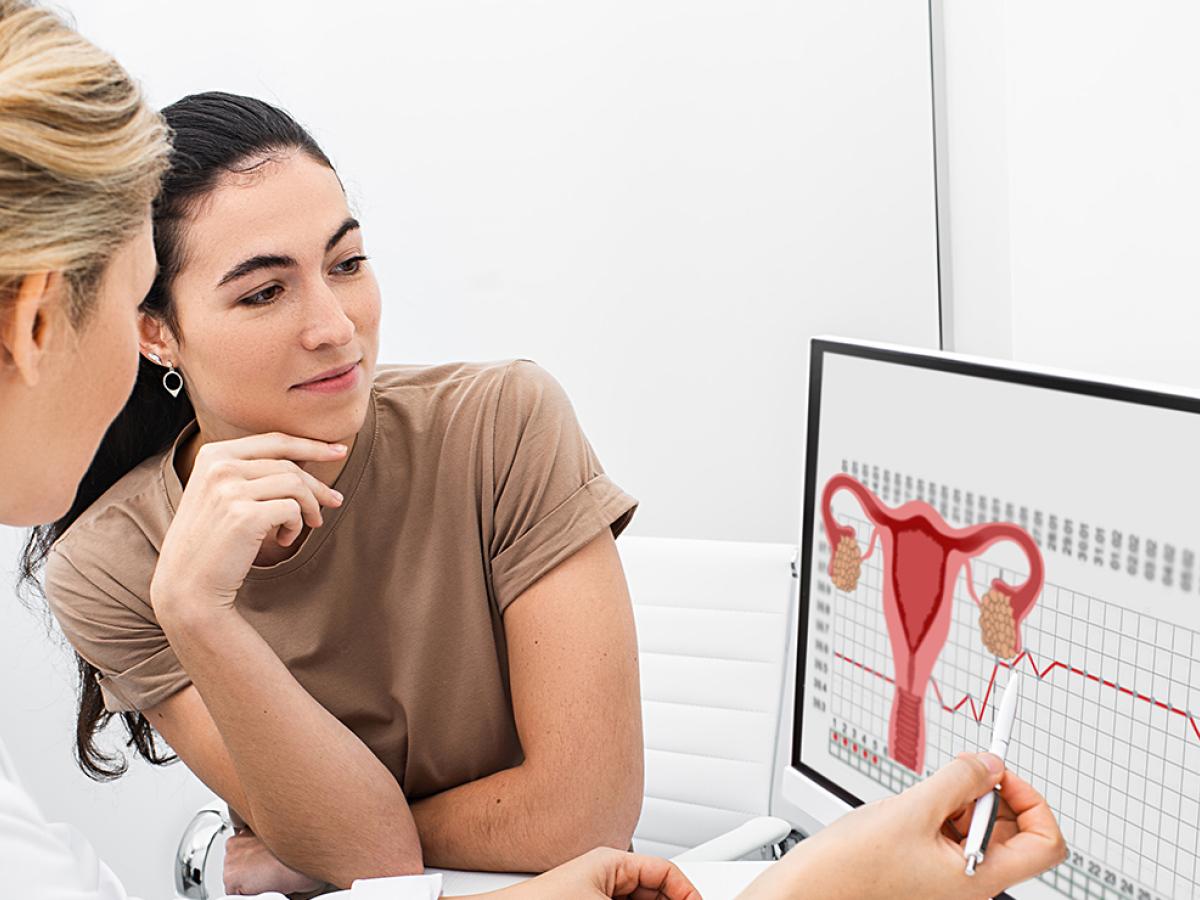February 26, 2024

Most women deal with menstrual periods for more than 35 years — typically from their teens into their 40s or 50s. For many, the monthly bloating and discomfort is a trade-off for the possibility of becoming pregnant and having children. But for some women with endometriosis, menstruation can come with severe pain, and pregnancy may not come easy.
Endometriosis is an estrogen-dependent inflammatory disease that occurs when abnormal uterine lining cells spread and grow outside the uterus. It can cause painful periods, pain with intercourse and chronic pelvic pain. But unknown to some, endometriosis may also increase the risk of infertility and certain pregnancy complications.

“My number one question for anyone suspecting endometriosis is, ‘What are your plans for childbearing?’” says Dr. Albert Hsu, an former MU Health Care OB/GYN specializing in reproductive endocrinology and infertility. “Because there are several ways that endometriosis can make having children a challenge.”
To help you make the best decisions for your family-building plans, Dr. Hsu shares 6 things every woman with endometriosis should know about its effect on fertility and pregnancy:
1. Treating Endometriosis May Be Difficult
Unfortunately, there’s no cure for endometriosis. You may find some relief from over-the-counter pain medication, but the best ways to successfully ease your pain include:
- Hormonal birth control, which increases progesterone and can make periods less painful or eliminate them altogether
- Surgery, which can diagnose and remove endometriosis tissue to temporarily keep the pain at bay
“The problem is that there’s no treatment for endometriosis pain that is both safe and effective for women who are trying to get pregnant,” Dr. Hsu says. “Almost all the treatments for medical management of endometriosis interfere with the menstrual cycle or may block ovulation.”
The bottom line is if you’re hoping to conceive a child soon, you’ll have to rely solely on over-the-counter pain relievers to ease your endometriosis symptoms. If you don’t want to get pregnant soon, Dr. Hsu suggests steps to preserve your fertility. “If you are delaying childbearing and in your 30s, you may consider the option of freezing eggs for the future,” he says, “because younger eggs work better than older eggs for fertility.”
2. Getting Pregnant With Endometriosis May Be Challenging
Some women with endometriosis may find it difficult to get pregnant. In fact, some studies show 25-40% of women with infertility are found to have endometriosis.
“Why is endometriosis associated with infertility? We do not know,” Dr. Hsu says. “But we certainly see higher rates of endometriosis in patients struggling with infertility.”
Some ways that endometriosis may make it hard to get pregnant include:
- Altered egg quality or function
- Scar tissue that blocks the fallopian tubes, preventing sperm from reaching the egg
- Endometrium (uterine lining) that isn’t ideal, causing issues for the embryo to implant in the uterus
3. Endometriosis is Associated With Decreased Fertility Success Rates
Endometriosis doesn’t just affect how easily you get pregnant. It may also impact how well infertility treatments work.
In vitro fertilization (IVF) has the best success rates for people with endometriosis, according to Dr. Hsu. But several studies show that women with endometriosis are up to 50% less likely to conceive through in vitro fertilization (IVF) than women without endometriosis.
During IVF, researchers found that endometriosis negatively impacts the reproductive cycle in several ways, including:
- Fertilization rate, how well sperm fertilizes mature eggs
- Implantation rate, how well an embryo implants itself into the uterus lining
- Number of eggs retrieved from the ovaries
“It’s true that patients with endometriosis may not respond as well to fertility medications, but it doesn’t mean they won’t respond at all,” Dr. Hsu says. “At the end of the day, you only need one egg to have a baby, and most women are born with a million eggs.”
4. Endometriosis May Increase the Risk of Pregnancy Complications
Experts are finding endometriosis may be associated with an increased risk of certain pregnancy complications, including:
- Miscarriage
- Placenta previa, when your placenta blocks the opening between the uterus and cervix
- Preterm birth, when a baby is born before 37 weeks
More research still needs to be done to understand the exact relationship between endometriosis and these pregnancy complications. But Dr. Hsu recommends letting your OB/GYN know if you suspect you may have endometriosis.
“We don’t do anything different for pregnant people with endometriosis,” he says. “But your doctor may stress ways to minimize preterm birth and educate you on the warning signs of other pregnancy complications.”
5. Pregnancy Can Improve Painful Endometriosis Symptoms
Pregnancy = no periods, and that can be music to the ears of women with endometriosis. It means the painful periods you experience may go away — at least for a while.
But pregnancy may also relieve endometriosis by altering your body’s hormonal balance. “Progesterone is a pro-gestational hormone — it’s very high in people who are pregnant,” Dr. Hsu says. “Since endometriosis is a progesterone-resistant condition, having increased progesterone naturally reduces symptoms of endometriosis.”
Experts don’t recommend pregnancy as a treatment option for endometriosis pain, but for some women, pregnancy can lessen the severity of their symptoms.
6. Progesterone-Based Medications May Alleviate Endometriosis Symptoms
If you have suspected endometriosis and are not pregnant or not actively trying to get pregnant, starting progesterone-only treatment may minimize the growth and spread of endometriosis. Even if you are breastfeeding, Dr. Hsu recommends talking to your doctor about using progesterone-only pills or a progesterone IUD, which won’t disrupt your milk supply.
“These treatments can help with pain and also minimize the risk of endometriosis rearing its ugly head, growing back and causing issues,” Dr. Hsu says.
Next Steps and Useful Resources
- Want to speak with a fertility specialist? Find one today.

